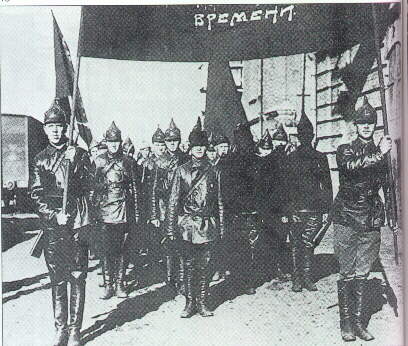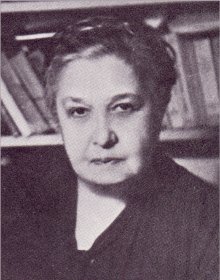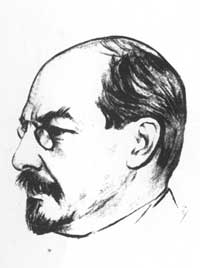Emma Goldman, My Disillusionment in Russia (1925)
CHAPTER IV
Moscow: First Impressions
Coming from Petrograd to Moscow is like being suddenly transferred from a desert to active life, so great is the contrast. On reaching the large open square in front of the main Moscow station I was amazed at the sight of busy crowds, cabbies, and porters. The same picture presented itself all the way from the station to the Kremlin. The streets were alive with men, women, and children. Almost everybody carried a bundle, or dragged a loaded sleigh. There was life, motion, and movement, quite different from the stillness that oppressed me in Petrograd.
I noticed considerable display of the military in the city, and scores of men dressed in leather suits with guns in their belts. "Tcheka men, our Extraordinary Commission," explained Radek. I had heard of the Tcheka before: Petrograd talked of it with dread and hatred. However, the soldiers and Tchekists were never much in evidence in the city on the Neva. Here in Moscow they seemed everywhere. Their presence reminded me of a remark Jack Reed had made: "Moscow is a military encampment," he had said; "spies everywhere, the bureaucracy most autocratic. I always feel relieved when I get out of Moscow. But, then, Petrograd is a proletarian city and is permeated with the spirit of the Revolution. Moscow always was hierarchical. Still the life was intense, varied, and interesting. What struck me most forcible, besides the display of militarism, was the preoccupation of the people. There seemed to be no common interest between them. Everyone rushed about as a detached unit in quest of his own, pushing and knocking against everyone else. Repeatedly I saw women or children fall from exhaustion without any one stopping to lend assistance. People stared at me when I would bend over the heap on the slippery pavement or gather up the bundles that had fallen into the street. I spoke to friends about what looked to me like a strange lack of fellow-feeling. They explained it as a result partly of the general distrust and suspicion created by the Tcheka, and partly due to the absorbing task of getting the day's food. One had neither vitality nor feeling left to think of others. Yet there did not seem to be such a scarcity of food as in Petrograd, and the people were warmer and better dressed.

Tcheka I spent much time on the streets and in the market places. Most of the latter, as also the famous Soukharevka, were in full operation. Occasionally soldiers would raid the markets; but as a rule they were suffered to continue. They presented the most vital and interesting part of the city's life. Here gathered proletarian and aristocrat, Communist and bourgeois, peasant and intellectual. Here they were bound by the common desire to sell and buy, to trade and bargain. Here one could find for sale a rusty iron pot alongside of an exquisite ikon; an old pair of shoes and intricately worked lace; a few yards of cheap calico and a beautiful old Persian shawl. The rich of yesterday, hungry and emaciated, denuding themselves of their last glories; the rich of to-day buying -- it was indeed an amazing picture in revolutionary Russia.
Who was buying the finery of the past, and where did the purchasing power come from? The buyers were numerous. In Moscow one was not so limited as to sources of information as in Petrograd; the very streets furnished that source.
The Russian people even after four years of war and three years of revolution remained unsophisticated. They were suspicious of strangers and reticent at first. But when they learned that one had come from America and did not belong to the governing political party, they gradually lost their reserve. Much information I gathered from them and some explanation of the things that perplexed me since my arrival. I talked frequently with the workers and peasants and the women on the markets.
The forces which had led up to the Russian Revolution had remained terra incognito to these simple folk, but the Revolution itself had struck deep into their souls. They knew nothing of theories, but they believed that there was to be no more of the hated barin (master) and now the barin was again upon them. "The barin has everything," they would say, "white bread, clothing, even chocolate, while we have nothing." "Communism, equality, freedom," they jeered, "lies and deception."
I would return to the National bruised and battered, my illusions gradually shattered, my foundations crumbling. But I would not let go. After all, I thought, the common people could not understand the tremendous difficulties confronting the Soviet Government: the imperialist forces arraigned against Russia, the many attacks which drained her of her men who otherwise would be employed in productive labour, the blockade which was relentlessly slaying Russia's young and weak. Of course, the people could not understand these things, and I must not be misled by their bitterness born of suffering. I must be patient. I must get to the source of the evils confronting me.
The National, like the Petrograd Astoria, was a former hotel but not nearly in as good condition. No rations were given out there except three quarters of a pound of bread every two days. Instead there was a common dining room where dinners and suppers were served. The meals consisted of soup and a little meat, sometimes fish or pancakes, and tea. In the evening we usually had kasha and tea. The food was not too plentiful, but one could exist on it were it not so abominably prepared.
Hotel National I saw no reason for this spoiling of provisions. Visiting the kitchen I discovered an array of servants controlled by a number of officials, commandants, and inspectors. The kitchen staff were poorly paid; moreover, they were not given the same food served to us. They resented this discrimination and their interest was not in their work. This situation resulted in much graft and waste, criminal in the face of the general scarcity of food. Few of the tenants of the National, I learned, took their meals in the common dining room. They prepared or had their meals prepared by servants in a separate kitchen set aside for that purpose. There, as in the Astoria, I found the same scramble for a place on the stove, the same bickering and quarrelling, the same greedy, envious watching of each other. Was that Communism in action, I wondered. I heard the usual explanation: Yudenitch, Deniken, Kolchak, the blockade -- but the stereotyped phrases no longer satisfied me.
Before I left Petrograd Jack Reed said to me: "When you reach Moscow, look up Angelica Balabanova. She will receive you gladly and will put you up should you be unable to find a room." I had heard of Balabanova before, knew of her work, and was naturally anxious to meet her.
Angelica Balabanova A few days after reaching Moscow I called her up. Would she see me? Yes, at once, though she was not feeling well. I found Balabanova in a small cheerless room, lying huddled up on the sofa. She was not prepossessing but for her eyes, large and luminous, radiating sympathy and kindness. She received me most graciously, like an old friend, and immediately ordered the inevitable samovar. Over our tea we talked of America, the labour movement there, our deportation, and finally about Russia. I put to her the questions I had asked many Communists regarding the contrasts and discrepancies which confronted me at every step. She surprised me by not giving the usual excuses; she was the first who did not repeat the old refrain. She did refer to the scarcity of food, fuel, and clothing which was responsible for much of the graft and corruption; but on the whole she thought life itself mean and limited. "A rock on which the highest hopes are shattered. Life thwarts the best intentions and breaks the finest spirits," she said. Rather an unusual view for a Marxian, a Communist, and one in the thick of the battle. I knew she was then secretary of the Third International. Here was a personality, one who was not a mere echo, one who felt deeply the complexity of the Russian situation. I went away profoundly impressed, and attracted by her sad, luminous eyes.
I soon discovered that Balabanova -- or Balabanoff, as she preferred to be called -- was at the beck and call of everybody. Though poor in health and engaged in many functions, she yet found time to minister to the needs of her legion callers. Often she went without necessaries herself, giving away her own rations, always busy trying to secure medicine or some little delicacy for the sick and suffering. Her special concern were the stranded Italians of whom there were quite a number in Petrograd and Moscow. Balabanova had lived and worked in Italy for many years until she almost became Italian herself. She felt deeply with them, who were as far away from their native soil as from events in Russia. She was their friend, their advisor, their main support in a world of strife and struggle. Not only the Italians but almost everyone else was the concern of this remarkable little woman: no one needed a Communist membership card to Angelica's heart. No wonder some of her comrades considered her a "sentimentalist who wasted her precious time in philanthropy." Many verbal battles I had on this score with the type of Communist who had become callous and hard, altogether barren of the qualities which characterized the Russian idealist of the past.
Similar criticism as of Balabanova I heard expressed of another leading Communist, Lunacharsky. Already in Petrograd I was told sneeringly, "Lunacharsky is a scatterbrain who wastes millions on foolish ventures." But I was eager to meet the man who was the Commissar of one of the important departments in Russia, that of education. Presently an opportunity presented itself.
Lunacharsky The Kremlin, the old citadel of Tsardom, I found heavily guarded and inaccessible to the "common" man. But I had come by appointment and in the company of a man who had an admission card, and therefore passed the guard without trouble. We soon reached the Lunacharsky apartments, situated in an old quaint building within the walls. Though the reception room was crowded with people waiting to be admitted, Lunacharsky called me in as soon as I was announced.
His greeting was very cordial. Did I "intend to remain a free bird" was one of his first questions, or would I be willing to join him in his work? I was rather surprised. Why should one have to give up his freedom, especially in educational work? Were not initiative and freedom essential? However, I had come to learn from Lunacharsky about the revolutionary system of education in Russia, of which we had heard so much in America. I was especially interested in the care the children were receiving. The Moscow Pravda, like the Petrograd newspapers, had been agitated by a controversy about the treatment of the morally defective. I expressed surprise at such an attitude in Soviet Russia. "Of course, it is all barbarous and antiquated," Lunacharsky said, "and I am fighting it tooth and nail. The sponsors of prisons for children are old criminal jurists, still imbued with Tsarist methods. I have organized a commission of physicians, pedagogues, and psychologists to deal with this question. Of course, those children must not be punished." I felt tremendously relieved. Here at last was a man who had gotten away from the cruel old methods of punishment. I told him of the splendid work done in capitalist America by Judge Lindsay and of some of the experimental schools for backward children. Lunacharsky was much interested. "Yes, that is just what we want here, the American system of education," he exclaimed. "You surely do not mean the American public school system?" I asked. "You know of the insurgent movement in America against our public school method of education, the work done by Professor Dewey and others?" Lunacharsky had heard little about it. Russia had been so long cut off from the western world and there was great lack of books on modern education. He was eager to learn of the new ideas and methods. I sensed in Lunacharsky a personality full of faith and devotion to the Revolution, one who was carrying on the great work of education in a physically and spiritually difficult environment.
He suggested the calling of a conference of teachers if I would talk to them about the new tendencies in education in America, to which I readily consented. Schools and other institutions in his charge were to be visited later. I left Lunacharsky filled with new hope. I would join him in his work, I thought. What greater service could one render the Russian people?
During my visit to Moscow I saw Lunacharsky several times. He was always the same kindly gracious man, but I soon began to notice that he was being handicapped in his work by forces within his own party: most of his good intentions and decisions never saw the light. Evidently Lunacharsky was caught in the same machine that apparently held everything in its iron grip. What was that machine? Who directed its movements?
Although the control of visitors at the National was very strict, no one being able to go in or out without a special propusk (permit), men and women of different political factions managed to call on me: Anarchists, Left Social Revolutionists, Coöperators, and people I had known in America and who had returned to Russia to play their part in the Revolution. They had come with deep faith and high hope, but I found almost all of them discouraged, some even embittered. Though widely differing in their political views, nearly all of my callers related an identical story, the story of the high tide of the Revolution, of the wonderful spirit that led the people forward, of the possibilities of the masses, the role of the Bolsheviki as the spokesmen of the most extreme revolutionary slogans and their betrayal of the Revolution after they had secured power. All spoke of the Brest Litovsk peace as the beginning of the downward march. The Left Social Revolutionists especially, men of culture and earnestness, who had suffered much under the Tsar and now saw their hopes and aspirations thwarted, were most emphatic in their condemnation. They supported their statements by evidence of the havoc wrought by the methods of forcible requisition and the punitive expeditions to the villages, of the abyss created between town and country, the hatred engendered between peasant and worker. They told of the persecution of their comrades, the shooting of innocent men and women, the criminal inefficiency, waste, and destruction.
How, then, could the Bolsheviki maintain themselves in power? After all, they were only a small minority, about five hundred thousand members as an exaggerated estimate. The Russian masses, I was told, were exhausted by hunger and cowed by terrorism. Moreover, they had lost faith in all parties and ideas. Nevertheless, there were frequent peasant uprisings in various parts of Russia, but these were ruthlessly quelled. There were also constant strikes in Moscow, Petrograd, and other industrial centres, but the censorship was so rigid little ever became known to the masses at large.
I sounded my visitors on intervention. "We want none of outside interference," was the uniform sentiment. They held that it merely strengthened the hands of the Bolsheviki. They felt that they could not publicly even speak out against them so long as Russia was being attacked, much less fight their régime. "Have not their tactics and methods been imposed on the Bolsheviki by intervention and blockade?" I argued. "Only partly so," was the reply. "Most of their methods spring from their lack of understanding of the character and the needs of the Russian people and the mad obsession of dictatorship, which is not even the dictatorship of the proletariat but the dictatorship of a small group over the proletariat."
When I broached the subject of the People's Soviets and the elections my visitors smiled. "Elections! There are no such things in Russia, unless you call threats and terrorism elections. It is by these alone that the Bolsheviki secure a majority. A few Mensheviki, Social Revolutionists, or Anarchists are permitted to slip into the Soviets, but they have not the shadow of a chance to be heard."
The picture painted looked black and dismal. Still I clung to my faith.
Chapter V: Meeting People


